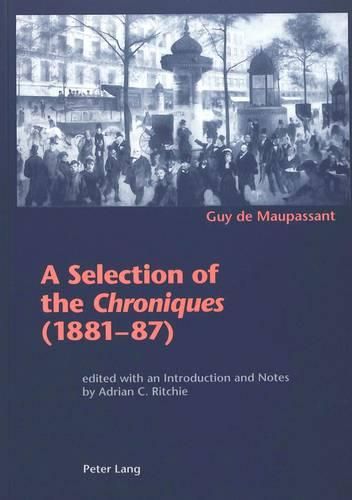Readings Newsletter
Become a Readings Member to make your shopping experience even easier.
Sign in or sign up for free!
You’re not far away from qualifying for FREE standard shipping within Australia
You’ve qualified for FREE standard shipping within Australia
The cart is loading…






This selection of Maupassant’s journalistic writings, edited in their original French version, encompasses articles on literary, artistic and social issues. Though many writers of the day, including Zola, Mirbeau, and Bourget, supplement their earnings by journalism, Maupassant was mindful of the warnings of his mentor Gustave Flaubert who insisted that journalism was an unworthy occupation for a self-respecting writer. But in 1880 Maupassant finally signed a contract with Le Gaulois and was soon to discover that a regular newspaper column could help him to hone his literary skills, extend his range, and develop his ideas. Critics are now aware that to ignore an activity which occupied a considerable portion of Maupassant’s time, during the years when he was most productive, is seriously to distort our view of the scope of a writer whose ideas and convictions are nowhere more clearly delineated than in his chroniques. Indeed, there is much of interest in these pieces written mostly for Le Gaulois, Gil Blas, and Le Figaro. Today’s reader can learn about the preoccupations of the reading public in France, about French society and its values, about public opinion, and about corruption in public life.
$9.00 standard shipping within Australia
FREE standard shipping within Australia for orders over $100.00
Express & International shipping calculated at checkout
This selection of Maupassant’s journalistic writings, edited in their original French version, encompasses articles on literary, artistic and social issues. Though many writers of the day, including Zola, Mirbeau, and Bourget, supplement their earnings by journalism, Maupassant was mindful of the warnings of his mentor Gustave Flaubert who insisted that journalism was an unworthy occupation for a self-respecting writer. But in 1880 Maupassant finally signed a contract with Le Gaulois and was soon to discover that a regular newspaper column could help him to hone his literary skills, extend his range, and develop his ideas. Critics are now aware that to ignore an activity which occupied a considerable portion of Maupassant’s time, during the years when he was most productive, is seriously to distort our view of the scope of a writer whose ideas and convictions are nowhere more clearly delineated than in his chroniques. Indeed, there is much of interest in these pieces written mostly for Le Gaulois, Gil Blas, and Le Figaro. Today’s reader can learn about the preoccupations of the reading public in France, about French society and its values, about public opinion, and about corruption in public life.